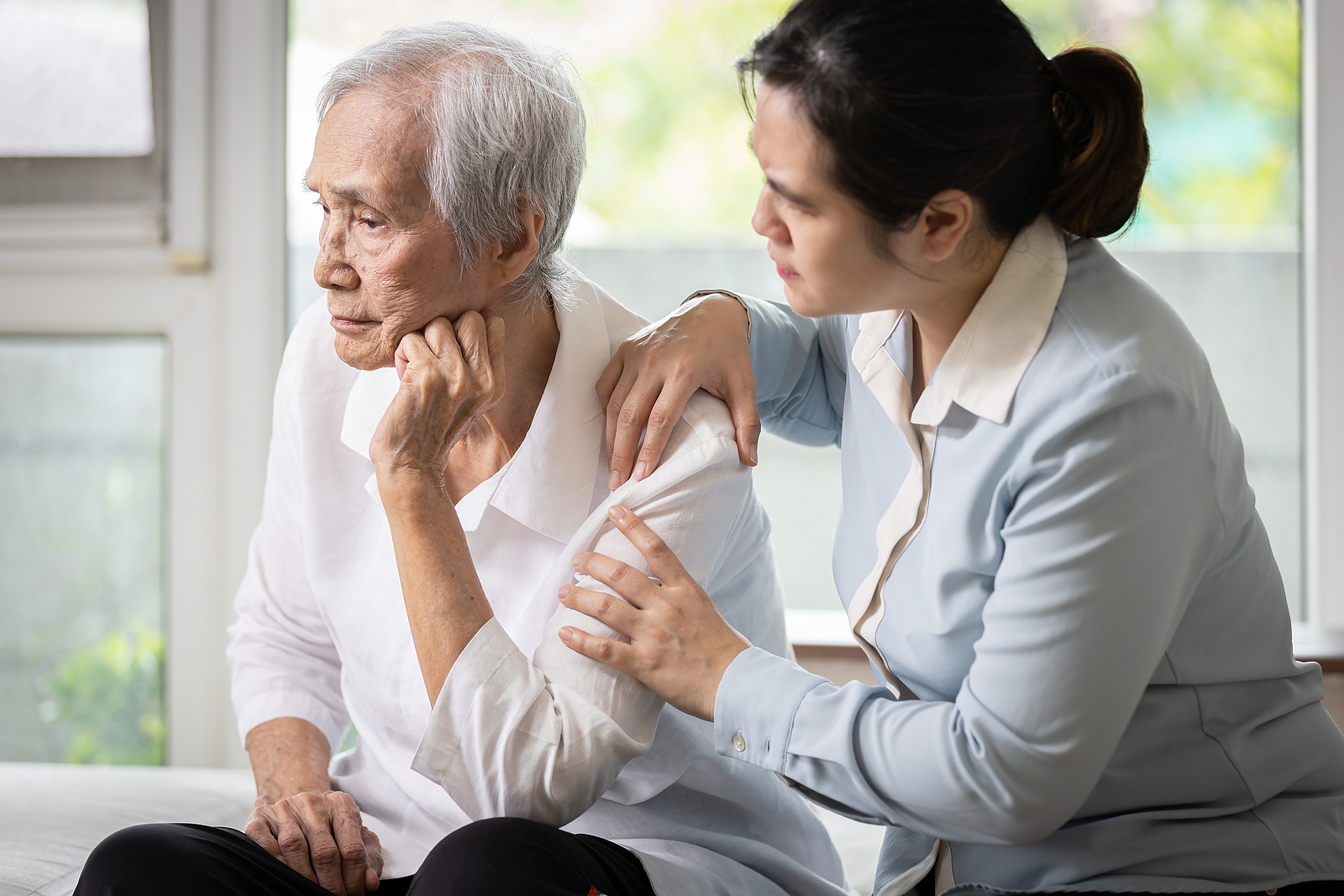When seniors have trouble sleeping, or difficulty concentrating, or develop aches or pains, it’s easy to explain the symptoms away as a normal part of aging. But, geriatric healthcare professionals want family members, friends, and caregivers to realize that these complaints could possibly be signs of depression.
Depression is often missed in seniors because older adults do not always exhibit common symptoms associated with depression, such as sadness and anxiety. Not only do people close to older adults miss the signs, but primary care physicians can overlook depression, too, in their elderly patients.
According to an article in the Psychiatric Clinics of North America journal, as many as 10 percent of older adults who go to their primary care doctors have significant depression, but only about half are recognized as having depression, and only 1 in 5 receive effective treatment in primary care.
What’s more, seniors who need home health care or are hospitalized are more likely to suffer from depression, according to the Centers for Disease Control and Prevention (CDC). The CDC reports that 13.5 percent of older adults who need home health care suffer from major depression compared to an estimated 1 percent to about 5 percent of seniors who do not need home health care. Depression is also seen in 11.5 percent of older hospital patients.
According to the National Institute on Aging, depression is not a normal part of aging.
Depression in older adults can be triggered by several factors, but chronic health conditions, such as heart disease, stroke, cancer, or Parkinson’s disease, rank high on the list of causes.
According to the CDC, 80 percent of older adults have at least one chronic health condition and 50 percent have two or more. So, seniors who suffer from chronic health conditions are at an increased risk for depression, the CDC says.
Besides health challenges, other factors that increase the likelihood of depression in older adults include:
- Death of a spouse or partner, relative, close friend, or pet
- Social isolation due to illness or moving from a home or a familiar environment to a new and unfamiliar environment
- Lack of purpose due to retirement, loss of spouse or friends, a decrease in finances, or lack of engagement with other people
- Fear of death due to health problems or other personal life changes
Older adults who care for their spouses or someone else on a daily basis can experience depression, too, because of social isolation as well as the physical, mental, and emotional demands that caregiving can bring.
Diagnosing depression in older adults is tricky because side effects of medications can sometimes mimic depression, cause depressive symptoms or make depression worse, according to Dr. Evelyn Granieri, assistant professor of medicine at Columbia University Irving Medical Center.
This is why it’s important for seniors to have a comprehensive psychiatric evaluation to determine whether the signs and symptoms are “true depression” only and not mixed with other disorders, Granieri said.
One way to detect depression in seniors is to watch for behavioral changes, and not “brush off” the changes as simply being a part of old age, said Dr. Ronald D. Adelman, co-chief of the Division of Geriatrics and Palliative Medicine at NewYork-Presbyterian/Weill Cornell Medical Center.
Family members and caregivers are encouraged to stay alert for symptoms of depression that may include:
- Feelings of sadness, hopelessness, helplessness, or despair
- Difficulty concentrating, memory problems
- Feeling grumpy, aggravated, irritable, or restless
- Unexplained aches and pains, headaches, or digestive problems that do not get better, even after treatment
- Insomnia, difficulty sleeping or excessive sleeping
- Loss of appetite, overeating, weight gain
- Loss of interest in hobbies and social activities that were once enjoyable
- Suicidal thoughts or attempts
- Fatigue, lack of energy
- Increase in alcohol consumption and drug use
- Self-isolation

Fortunately, family members or caregivers can play a role in reducing or preventing depression in older adults by intervening when they see these and other behavioral changes in the person’s life.
People of all ages feel “blue” or “down in the dumps,” at times. However, older adults with mobility problems or certain health issues may have these feelings longer because of their limitations.
So, health experts encourage family members or caregivers to help seniors stay active as much as possible. Activities seniors enjoy, whether gardening, playing games, or going to a senior center, can improve their quality of life and possibly prevent or reduce depression.
The following are tips that may help older adults ward off depression while improving their mental and physical health:
- Regular exercise. Exercise (as directed by a health professional) keeps the body in shape and improves mental health as well.
- Volunteer. By volunteering with organizations that assist older adults or others in the community, seniors not only reap the benefits of helping others but remain engaged in their community.
- Learn a new skill. The adage, “you’re never too old to learn” rings true at any age, but especially for older adults. Taking a class or learning a new skill helps seniors improve their brain health as well as boost their self-confidence.
- Keep Socially Active. Studies list a number of benefits of social interaction, such as improved mood, sleep, and overall physical and mental health.
- Persistance. Be persistent in overcoming obstacles. Some seniors run into obstacles, such as a lack of transportation, to get to an activity. Seniors can ask family members, friends, caregivers, or a community organization that offers senior services to provide, or arrange for, transportation. Caregivers can also provide the companionship needed for in-home activities, such as playing games or exercising.
- What’s most important is helping seniors talk about their feelings, even if they have not been diagnosed with depression, and encouraging those with symptoms of depression to get treatment.
- Unfortunately, some older adults, particularly those over 85, see a stigma associated with depression, Adelman said. For example, some seniors who sense they are depressed, believe that they do not “have the backbone that they used to have,” he said.
- Adelman said he stresses to his patients that depression is a disease, just like high blood pressure, and it’s not something for which they are responsible. And, once depression is treated, Adelman said an older adult’s cognitive abilities and quality of life can come right back.
Besides health challenges, other factors that increase the likelihood of depression in older adults include:
- Death of a spouse or partner, relative, close friend, or pet
- Social isolation due to illness or moving from a home or a familiar environment to a new and unfamiliar environment
- Lack of purpose due to retirement, loss of spouse or friends, a decrease in finances, or lack of engagement with other people
- Fear of death due to health problems or other personal life changes
https://www.laconiadailysun.com/community/health_and_wellness/elderly-home-care-and-depression-symptoms-and-prevention-tips/article_9ef0436a-148a-11eb-b3d6-27f7c361ce29.html
https://www.ncbi.nlm.nih.gov/pmc/articles/PMC3184156/
https://www.cdc.gov/aging/mentalhealth/depression.htm
https://healthmatters.nyp.org/how-to-spot-depression-in-seniors/
https://www.liveinhomecare.com/elderly-home-care-and-depression-symptoms-and-prevention-tips-2/information/#:~:text=The%20CDC%20reports%20that%2013.5,percent%20of%20older%20hospital%20patients.



